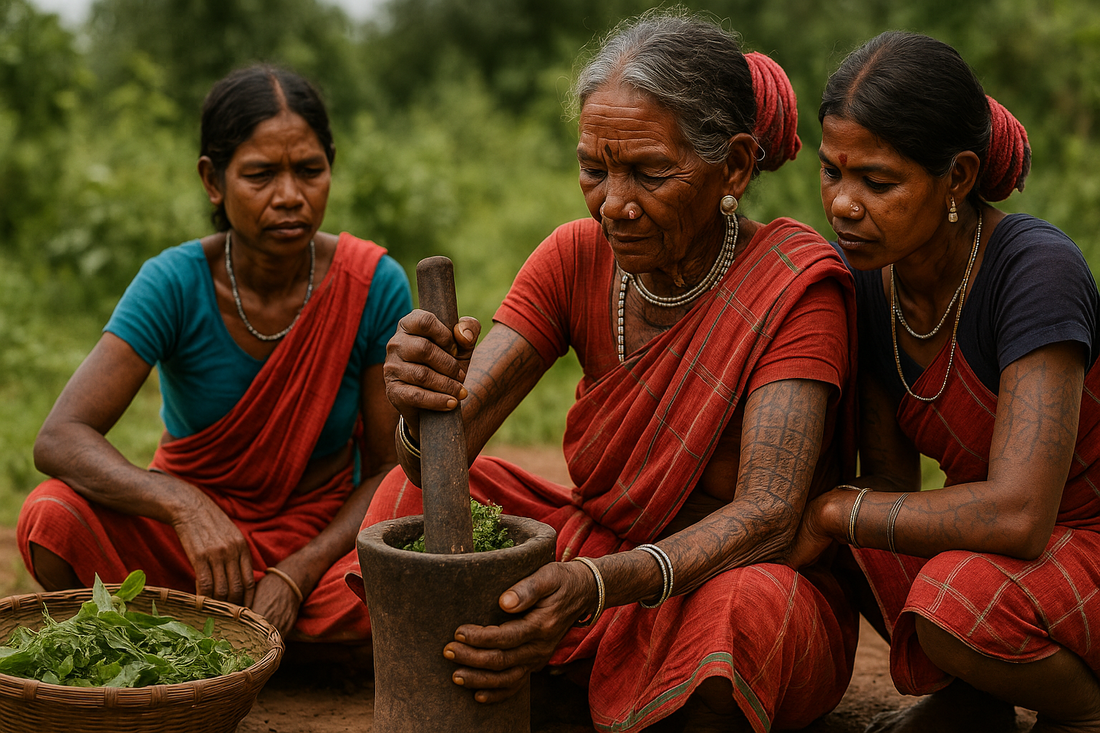
Forest Healers of India: The Baiga Tribe’s Vanishing Knowledge of Medicinal Plants
Share
Introduction
In the forests of central India, the Baiga tribe holds one of the richest reservoirs of traditional plant knowledge in the world. As forest healers, the Baigas have relied on biodiversity to support their communities for generations. But this vast knowledge of tribal herbal medicine is rapidly disappearing due to environmental loss and cultural disruption.
This blog explores how the Baigas use plants to treat illnesses, the threats to their practices, and why preserving their wisdom matters for the future of natural healing.
Traditional Healing Practices of the Baiga Tribe

Baiga herbalism is guided by ecological knowledge and intuition. Their healers — known as Gunia or Vaidya Baiga — use combinations of forest herbs to treat common and chronic illnesses, often tailoring the remedy based on the person’s body type, the season, and environmental cues.
Documented Examples of Baiga Medicinal Plant Use:
- Chlorophytum borivilianum (Safed Musli): Used to enhance stamina and reproductive health. NCBI Review
- Gymnema sylvestre (Gurmar): Known to reduce blood sugar levels in diabetic patients. Study
- Terminalia chebula, T. bellirica, Emblica officinalis (Triphala): Detoxifies and improves digestion. Research
- Holarrhena antidysenterica (Kuda): Used for dysentery and intestinal infections.
- Cassia tora: Used as a paste for ringworm and skin conditions.
- Aegle marmelos (Bael): Treats gastrointestinal distress and promotes gut health.
Each remedy is prepared manually, using hand-ground powders, decoctions, and infusions, often administered with local carriers like ghee, honey, or milk.
Why Baiga Medicinal Knowledge is Disappearing
1. Deforestation and Land Displacement
As forest areas shrink due to logging, mining, and infrastructure projects, Baiga communities are losing access to key medicinal plants.
2. Loss of Oral Traditions
Most of the tribe’s plant knowledge is passed down verbally. With elders passing and youth migrating to cities, much of this knowledge is disappearing unrecorded.
3. Economic and Social Pressures
Tribal medicine is seen as outdated by younger generations, who are encouraged to adopt modern education and leave behind “primitive” ways.
4. Inadequate Legal Protection
Indigenous knowledge is often used by pharmaceutical companies without consent or benefit sharing, leading to cultural exploitation.
A 2021 survey in the Journal of Ethnobiology found that fewer than 1 in 5 Baiga youth could identify five key medicinal plants used by their grandparents. (IJTK)
Why It’s Urgent to Protect This Knowledge
Baiga plant wisdom offers more than folk remedies — it provides:
- Potential leads for drug discovery and phytotherapy
- Sustainable and low-cost healthcare models
- Conservation insights for native forest ecosystems
- A cultural framework for living in harmony with nature
Their knowledge is highly aligned with modern concepts like gut health, immune support, detoxification, and bioadaptogens — yet remains underrecognized and underfunded.
How to Preserve Baiga Healing Wisdom
- Ethnobotanical documentation: Field researchers and NGOs should work with Baiga elders to record plant use and rituals before it’s lost.
- Community conservation programs: Forest rights and stewardship must be granted to ensure Baigas can continue to access native herbs.
- Ethical collaboration: Ayurvedic and herbal brands should recognize and credit Baiga knowledge if used commercially.
- Youth education: Introduce community-based learning that blends ancestral knowledge with modern botany.
Conclusion
The Baiga tribe's healing heritage is a fragile thread connecting culture, ecology, and natural medicine. It is not just a tribal tradition — it is a repository of plant-based healing wisdom that the world may never recover if lost.
To honor and preserve it is to take a step toward healing not just individuals, but entire ecosystems.
References
- NCBI: Review on Chlorophytum borivilianum (Safed Musli)
- NCBI: Antidiabetic potential of Gymnema sylvestre
- NCBI: Health benefits of Triphala
- IJTK: Medicinal Plants and Traditional Knowledge of Baiga Tribes
 Health & Wellness
The Baiga Tribe — Forest Dwellers of Wisdom and Struggle
Health & Wellness
The Baiga Tribe — Forest Dwellers of Wisdom and Struggle
Discover the life, traditions, and challenges of the Baiga tribe — one of India's most spiritually connected indigenous communities now facing the harsh realities of modernization.
May 23, 2025 at 3:47 PM Health & Wellness
Uplifting the Baiga Tribe: A Vision Rooted in Healing and Dignity
Health & Wellness
Uplifting the Baiga Tribe: A Vision Rooted in Healing and Dignity
The Baigas are known for their deep knowledge of medicinal plants — yet live in poverty, isolated and underserved. Ayurvance aims to change that, with your help.
May 23, 2025 at 3:40 PM

 https://ayurvance.com
https://ayurvance.com